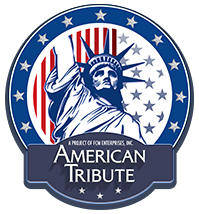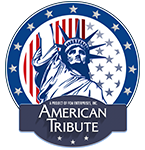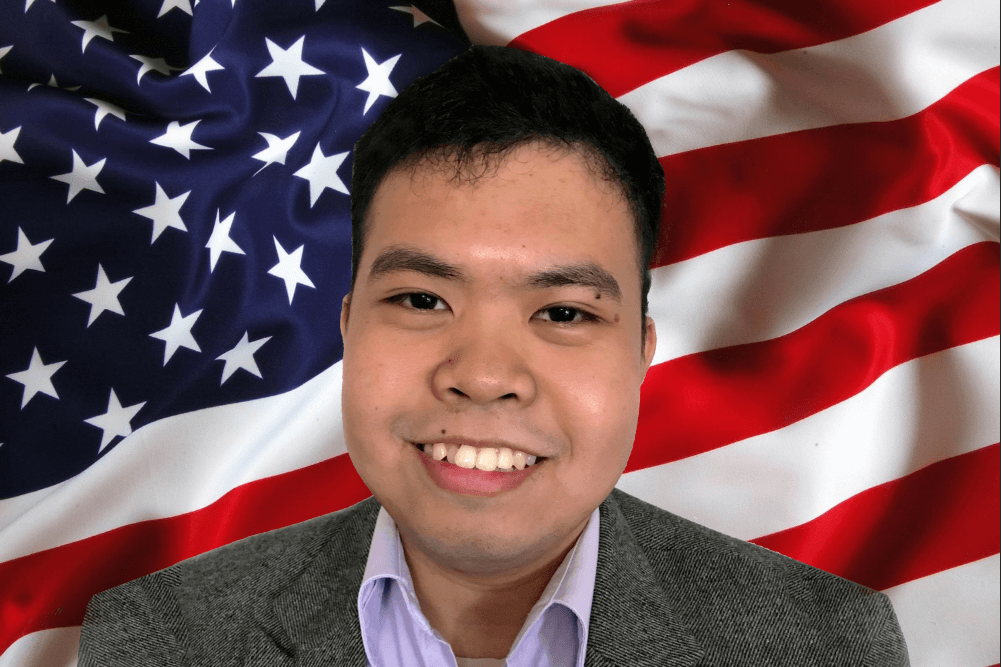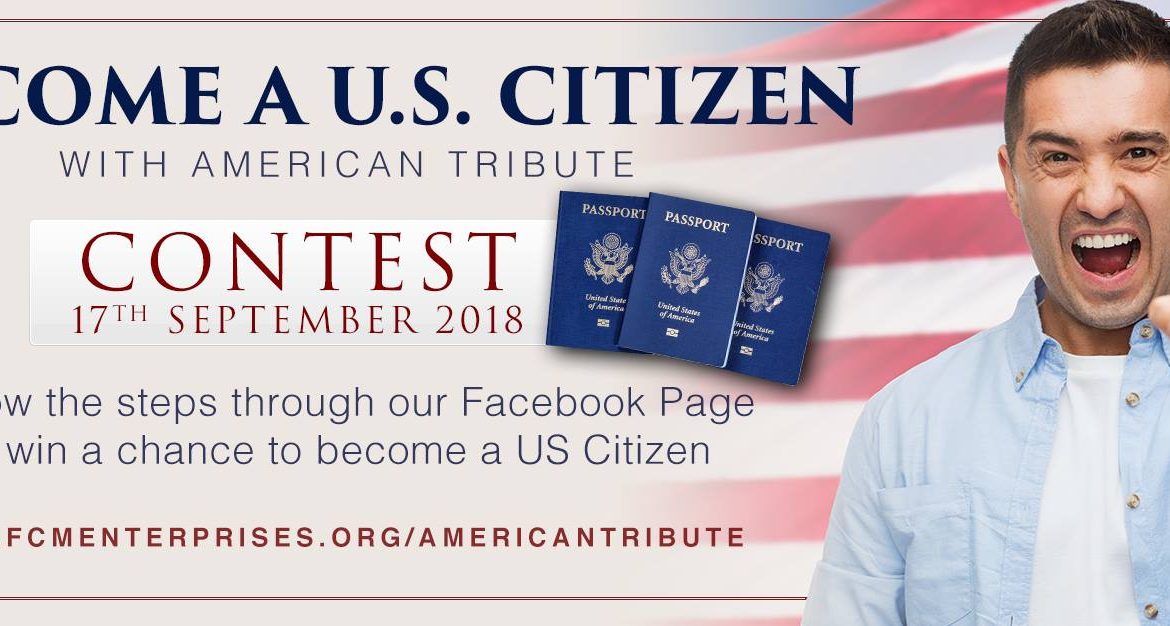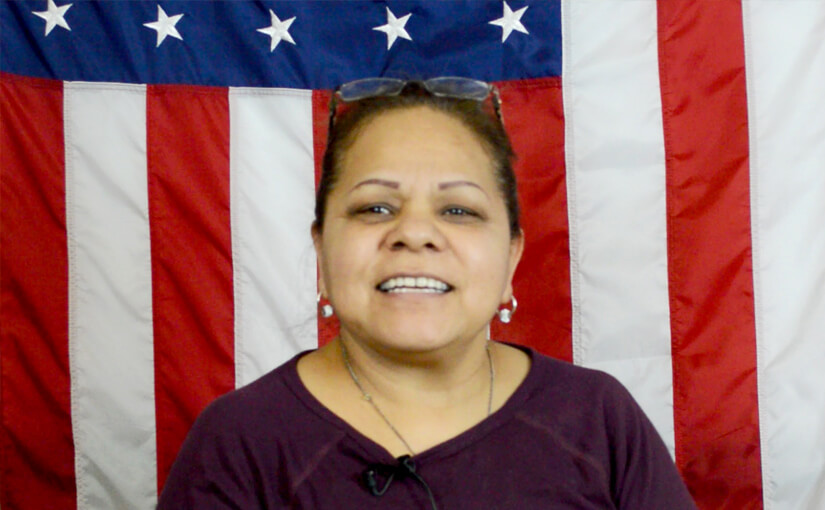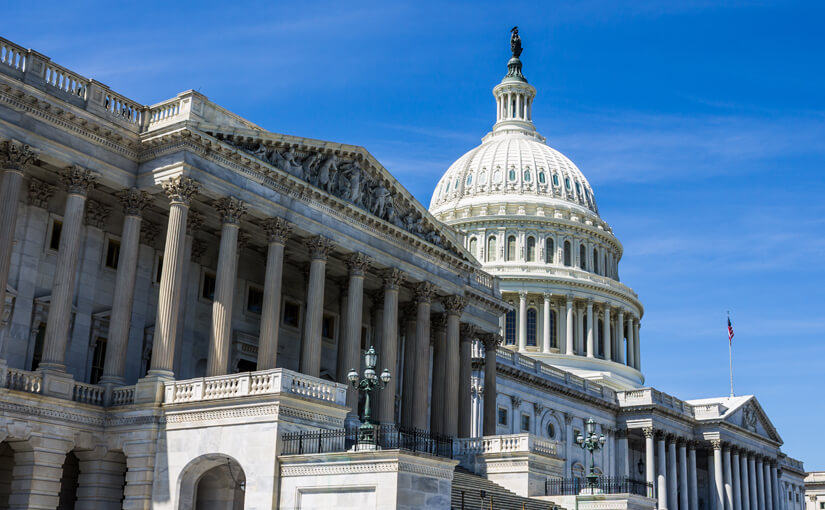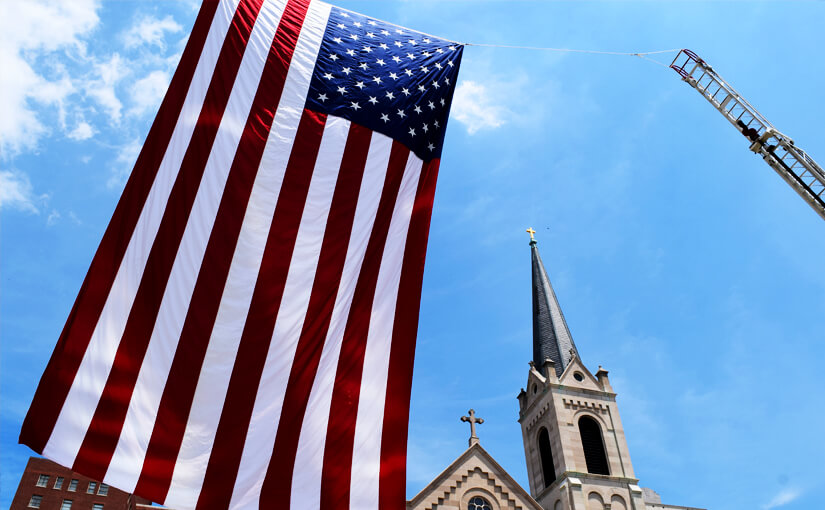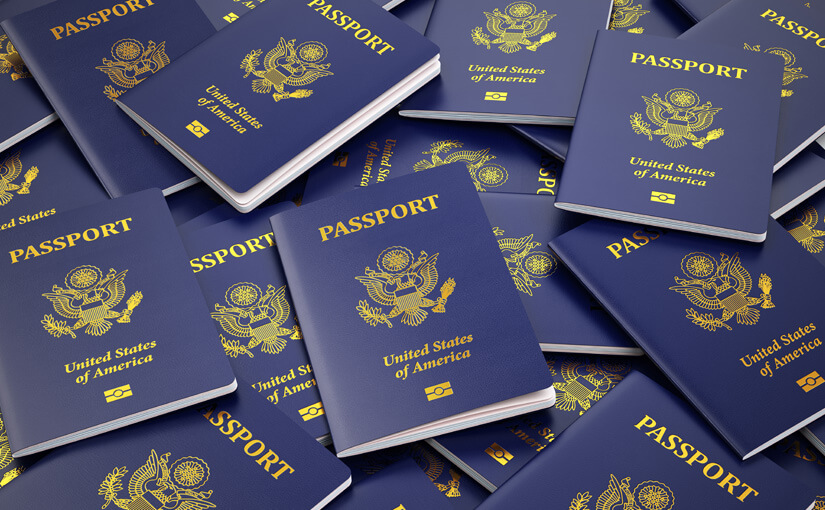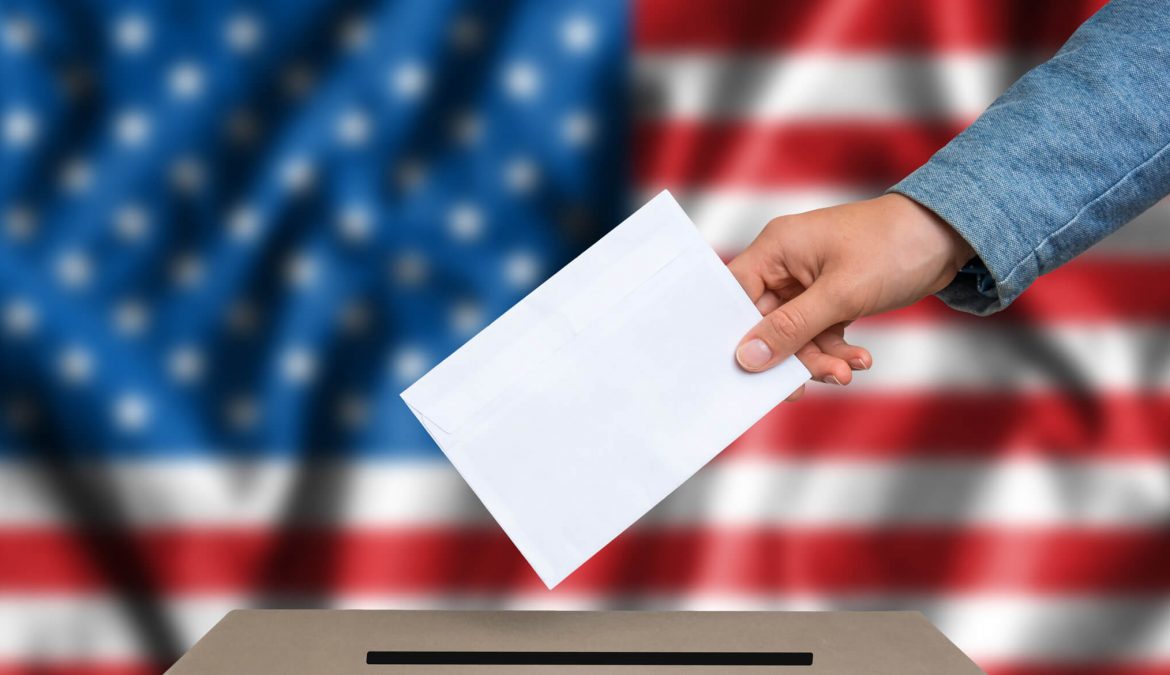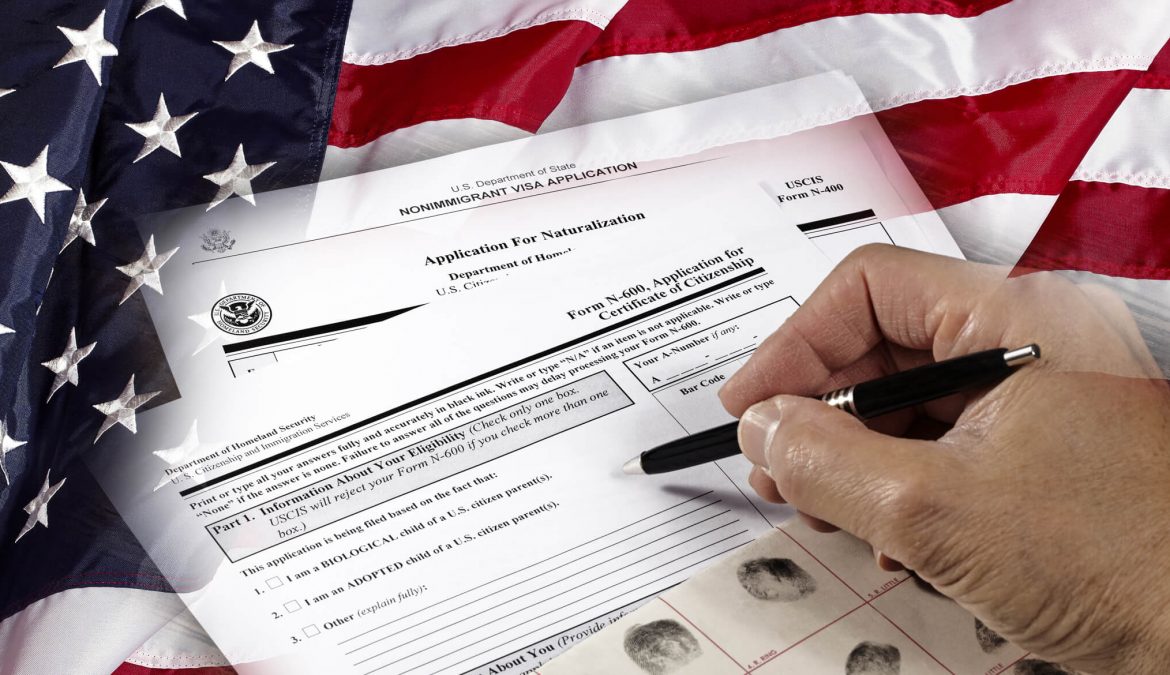The winner of the contest to have his naturalization fees paid is Jose Vien Torres from San Bernardino, California!!
Jose is looking forward to the day he can raise his hand and be sworn in as a U.S. Citizen !!
What are you waiting for? Make 2019 the year that you “join the team” !!
Remember, we will have another contest very soon!!
#AmericanTribute #BecomeAUSCItizen #FCMEnterprises #ToBeAmerican #QuickCivicsLessons #NaturalizationTest #USCitizenship #USCIS ![]()
Category: Immigration
American Tribute is sponsoring a “Constitution Day” contest
Make 2018 the year that you become a U.S. Citizen! American Tribute is sponsoring a “Constitution Day” contest to have your USCIS fees paid when you submit your application for naturalization.
Make sure you read the complete rules before you enter!
You must have “liked” the Facebook page of American Tribute.
Enter by private messaging the Facebook page “American Tribute” in English.
You must include contact information (email or phone number) and the phrase:
“I want to be an American! The Constitution is the supreme law of the land!” in the message.
Before the drawing, you will be contacted to ensure that you are eligible.
You must be a permanent resident, live in the United States, and are otherwise eligible to naturalize. See https://www.uscis.gov/us-citizenship/citizenship-through-naturalization/path-us-citizenship to determine if you are eligible to naturalize.
You must not have a criminal record.
A winner will be chosen from the valid entries by random drawing at 7 a.m. Central time on September 17, 2018 – Constitution Day! We will make every effort to post the name of the winner as soon as possible after noon Central time.
The winner will have until September 25, 2018 to confirm eligibility and prepare N-400 paperwork.
If the winner does not have a completed N-400 by September 25, 2018, the prize will expire.
American Tribute reserves the right to select an alternate winner if the initial winner is ineligible.
This is not a cash prize – American Tribute will pay your USCIS fee to submit your form N-400 Application for Naturalization, but WILL NOT pay you any money directly.
The winner agrees to allow publication of their name and image on the American Tribute website and Facebook page, both after winning the contest and after they become a U.S. citizen.
This contest is not an offer of legal representation.
Determination of eligibility is subject to review by the Project Manager.
American Tribute is a project of FCM Enterprises, Inc., a 501(c)(3) non-profit corporation.
#AmericanTribute #BecomeAUSCItizen#FCMEnterprises #ToBeAmerican#QuickCivicsLessons #NaturalizationTest#USCitizenship #USCIS
Presidents Day Contest Winner!!
The winner of the contest to have her naturalization fees paid is Francisca Torres of Midland!!
Francisca is looking forward to the day she can raise her hand an be sworn in as a U.S. Citizen !!
What are you waiting for? Make 2018 the year that you “join the team” !! Remember, we will have another contest in July, for “Independence Day”.
#AmericanTribute #BecomeAUSCItizen #FCMEnterprises #ToBeAmerican#QuickCivicsLessons #NaturalizationTest #USCitizenship #USCIS ![]()
13. Name one branch or part of the government *
- Congress
- Legislative
- President
- Executive
- The courts
- Judicial
The Constitution establishes three branches of government: legislative, executive, and judicial. Article I of the Constitution establishes the legislative branch. Article I explains that Congress makes laws.
Congress (the Senate and the House of Representatives) is the legislative branch of the U.S. government. Article II of the Constitution establishes the executive branch.
The executive branch enforces the laws that Congress passes. The executive branch makes sure all the people follow the laws of the United States.
The president is the head of the executive branch.
The vice president and members of the president’s cabinet are also part of the executive branch.
Article III of the Constitution establishes the judicial branch. The judicial branch places the highest judicial power in the Supreme Court.
One responsibility of the judicial branch is to decide if government laws and actions follow the Constitution. This is a very important responsibility.
** As you prepare for U.S. citizenship, Learn About the United States: Quick Civics Lessons will help you study for the civics and English portions of the naturalization interview. There are 100 civics (history and government) questions on the naturalization test. During your naturalization interview, you will be asked up to 10 questions from the list of 100 questions. You must answer correctly six (6) of the 10 questions to pass the civics test.
12. What is the “rule of law”?
- Everyone must follow the law.
- Leaders must obey the law.
- Government must obey the law.
- No one is above the law.
John Adams was one of the Founding Fathers and the second president of the United States. He wrote that our country is, “a government of laws, and not of men.”
No person or group is above the law. The rule of law means that everyone (citizens and leaders) must obey the laws. In the United States, the U.S. Constitution is the foundation for the rule of law.
The United States is a “constitutional democracy” (a democracy with a constitution). In constitutional democracies, people are willing to obey the laws because the laws are made by the people through their elected representatives. If all people are governed by the same laws, the individual rights and liberties of each person are better protected.
The rule of law helps to make sure that government protects all people equally and does not violate the rights of certain people.
** As you prepare for U.S. citizenship, Learn About the United States: Quick Civics Lessons will help you study for the civics and English portions of the naturalization interview. There are 100 civics (history and government) questions on the naturalization test. During your naturalization interview, you will be asked up to 10 questions from the list of 100 questions. You must answer correctly six (6) of the 10 questions to pass the civics test.
10. What is freedom of religion?
- You can practice any religion, or not practice a religion.
Colonists from Spain, France, Holland, England, and other countries came to America for many different reasons. One of the reasons was religious freedom.
The rulers of many of these countries told their citizens that they must go to a certain church and worship in a certain way. Some people had different religious beliefs than their rulers and wanted to have their own churches. In 1620, the Pilgrims were the first group that came to America seeking religious freedom.
Religious freedom was also important to the Framers. For this reason, freedom of religion was included in the Constitution as part of the Bill of Rights. The First Amendment to the Constitution guarantees freedom of religion.
The First Amendment states, “Congress shall make no law respecting an establishment of religion, or prohibiting the free exercise thereof.” The First Amendment also prohibits Congress from setting up an official U.S. religion, and protects citizens’ rights to hold any religious belief, or none at all.
** As you prepare for U.S. citizenship, Learn About the United States: Quick Civics Lessons will help you study for the civics and English portions of the naturalization interview. There are 100 civics (history and government) questions on the naturalization test. During your naturalization interview, you will be asked up to 10 questions from the list of 100 questions. You must answer correctly six (6) of the 10 questions to pass the civics test.
In the first 3 quarters of 2017, people originally from Mexico accounted 16.5% of the total of all the people who became naturalized citizens
In the first 3 quarters of 2017, people originally from Mexico accounted for 77,655 of all the people who became naturalized citizens.
That is approximately 16.5% of the total.
Another large segment was people originally from Asia who accounted for 35.1% of the total.
The smallest representation was people origination from Republic of Guinea-Bissau (in West Africa) who only had 13 people become naturalized U.S. citizens.
We now call these folks our American brothers and sisters.
Has anybody ever asked you if you want to naturalize and become a U.S. citizen?
Why don’t you get rid of that green card, and move up to becoming a naturalized U.S. Citizen?
Why don’t you get rid of that green card, and move up to becoming a naturalized U.S. Citizen?
Why would you want to do that?
Here’s one reason – you can vote.
A lot of people think voting is a burden, but it is not. Voting is your way of affecting how the laws are made in this country and which people run the government. This is extremely important; there are many countries all over the world whose citizens can’t vote. The people have no control over the laws or the government. So being able to vote is the number one reason for you to become a U.S. citizen.
Another reason to become a U.S. citizen would be to serve on a jury.
There are many people who think that’s also a burden, but if you are accused of a crime, wouldn’t you want someone like you on your jury? Someone who has been through the same experiences as you? The jury determines whether or not you are innocent or guilty – do you want to be judged by people who know nothing of your life?
One final reason has to do with your rights and responsibilities, that would be that most elected officials in this country can only be U.S. citizens.
So, if you vote that’s great, if you serve on a jury that’s terrific,
But if you really want to make some changes, if you really want to serve your fellow citizens, why don’t you run for office?
Well – you can’t do that until you become a U.S. citizen!
Here’s your number one reason to naturalize and become a U.S. citizen
If you and your children are permanent residents – you all have green cards, here’s your number one reason to naturalize and become a U.S. citizen:
Here you go –
You have to study. Yes.
You have to pay a fee. Yes.
You have to speak English well enough to pass. Yes.
But if you do that, and if you pass, and if you become a U.S. citizen . . . and you have children living with you in the United States, under the age of 18, who are also “green card” holders, they automatically become U.S. citizens. No charge for the children!! No test for the children!!
Besides the savings, you will have the peace of mind to know that when your children turn 18, they will already be a U.S. citizen, with no chance of being deported. What other reason do you need to naturalize?
